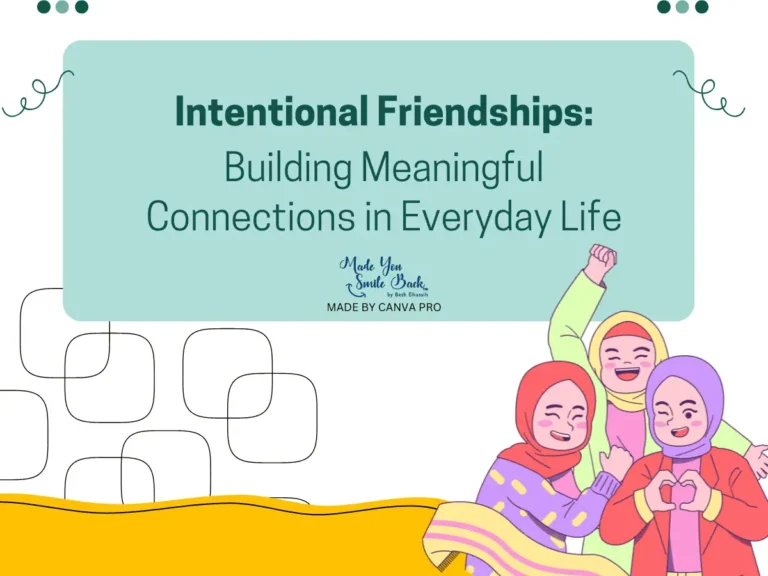🕒 Last Updated on May 23, 2025
Intentional Friendships: Building Meaningful Connections in Everyday Life
Making and keeping friendships can feel tough, especially when life gets hectic. Intentional friendships are connections you create on purpose, with real thought and care—not just by accident.
Choosing to be more intentional in your friendships means you carve out time, communicate honestly, and actually show support. It’s about making that effort, even when you’re tired or distracted.
Intentional friendships don’t just fall into your lap—they grow when you put in steady work. Being a good listener, showing up when it counts, and reaching out all help you build friendships that last.
You can check out practical ideas for being a more intentional friend and what it means to really connect with purpose. Sometimes, even small changes make a big difference.

What Are Intentional Friendships?
Intentional friendships are built on choice, clear effort, and attention. Both people are actively working to keep the relationship healthy, meaningful, and supportive.
Defining Intentional Relationships
An intentional friendship is a relationship you enter with purpose and care. Instead of just letting things happen, you both choose to invest time and energy.
You might set aside moments to talk or check in, making sure you know how your friend is doing. Unlike casual connections, intentional relationships are mindful and deliberate.
You stay aware of your actions and words, aiming to be there for each other when needed. This kind of friendship usually means honest talks about feelings, needs, and boundaries.
Get your Freebie
You and your friend share a goal: to create a trusting and respectful bond. There’s a bigger focus on understanding, kindness, and helping each other grow—even when things get rough.
Core Values of Intentional Friendship
Intentional friendships are rooted in strong core values that set them apart from less committed relationships. Some important values include:
- Trust: You both trust each other with your thoughts and feelings.
- Honesty: Speaking truthfully, even when it’s tough.
- Respect: Listening and respecting your friend’s views.
- Reliability: Following through on promises and showing up.
- Mutual support: Encouraging and helping each other in tough times.
These values make friendships more meaningful. Building intentional friendships can also make you more self-aware, since you’ll notice how your actions affect the other person.
Clear communication helps disagreements get sorted out, creating a safer space for both of you. Honestly, these are the things that make intentional friendships more authentic and lasting than most.
Intentional Friends vs. Casual Acquaintances
You’ll notice some big differences between intentional friends and casual acquaintances. In intentional friendships, you actually make time for each other and check in to see how things are going.
Casual acquaintances don’t really get that kind of effort. Most interactions just happen by chance, and you probably won’t feel comfortable sharing personal stuff.
There’s usually less trust and commitment with acquaintances. Intentional friendships tend to last longer because you’re both willing to address problems and adapt as life changes.
You both act on purpose, instead of letting the friendship drift. These small, deliberate actions are what separate close, intentional friends from people you just know in passing.
To dig deeper into what makes these relationships unique, check out what an intentional friendship really looks like.

Intentional friendships depend on a few key qualities. Focusing on trust, open communication, and healthy boundaries can really strengthen the relationships that matter most to you.
Establishing Trust and Vulnerability
Trust is the backbone of every solid friendship. To build trust, you need to be truthful, keep promises, and respect your friend’s privacy.
Small acts—like showing up on time or remembering important dates—help your friend feel valued. Vulnerability is just as important for genuine friendships.
When you share what you really think or feel, your friend can relate to you better. Being open about your struggles might even encourage your friend to do the same.
Mutual vulnerability builds deeper trust. Take turns sharing, listen carefully, and respond with support. If you want your friend to trust you, show that you trust them first.
Effective Communication in Relationships
Good communication is essential. When you talk, try to be clear about how you feel or what you want—don’t expect your friend to read your mind.
Listening matters just as much as speaking. Give your friend your full attention, ask simple questions, and repeat back what you heard so you’re on the same page.
If you disagree, stay calm. Healthy friendships can handle differences if you treat each other with respect. Practice active listening, and work together to find some middle ground.
For more practical tips, check out this page on intentional friendship.
Setting Boundaries for Healthy Friendships
Setting clear boundaries keeps friendships healthy and avoids misunderstandings. That means being honest about your needs and limits.
If you need alone time, let your friend know instead of just disappearing. Boundaries also mean respecting your friend’s time, space, and feelings.
Don’t expect your friend to meet every need, and let them set their own limits without pressure. If someone crosses a boundary, bring it up kindly but directly.
Good friends won’t mind hearing what you’re comfortable with. Addressing boundary issues early helps keep things strong and avoids bigger problems later. Need more advice? Here’s a useful guide on fragile friendship foundations.

Intentional Friendships and Personal Growth
Building intentional friendships helps you become more self-aware. These relationships aren’t just random—they help you build habits that support your goals and help each other become better people.
Mutual Growth Through Life Experiences
Intentional friendships are about shared effort and respect. You and your friend choose to spend time together, not just for fun but to learn from each other’s experiences.
When you talk about challenges at work or with family, your friend can offer honest advice or just listen. Through these connections, both of you get new perspectives.
You see each other’s wins and setbacks, which lets you reflect on your own choices. According to The Plain Simple Life, intentional friendships grow when both people are committed to each other’s well-being and progress.
You might try new things together, like taking a class or volunteering. These activities push you out of your comfort zone and help you build new skills.
By making friendship a priority, you help each other grow as individuals. You don’t have to do it all alone.
Encouraging Accountability and Purpose
Intentional friends help you stay on track with your goals. When you share something you want to achieve—like starting a new habit or finishing a project—they can check in and motivate you.
This kind of accountability makes your goals feel more real. You’re less likely to quit when someone genuinely cares about your progress.
Being accountable also improves trust. You learn to rely on your friend, and they learn to rely on you.
Intentional friendships involve clear communication and honest feedback. If you’re struggling, your friend can offer practical support or remind you of your strengths.
As Tabansi Sandra explains, friendships built on purpose encourage each person to be present and take action toward their goals.

Intentional Friendships for Different Life Stages
Making and keeping friendships isn’t always easy as people move through different times in their lives. Being thoughtful and taking real steps can help you keep close friends, even when life changes and personal situations shift.
Friendships Among Single Adults
If you’re single, friendships might fill a bigger chunk of your daily life and support system. Being intentional is about reaching out, making plans, and showing up for your friends when they need you.
Single adults usually have more flexible schedules. That can make it easier to throw together a movie night or a group dinner.
But you’ll probably want to set some boundaries around your time and needs, too. Open conversations help—talk about your plans and how you’re feeling.
Maybe you’ll join a new club or pick up an activity together to keep things fresh. Friends have different routines and priorities as life shifts, so being willing to adjust is just part of the deal.
Navigating Friendship and Dating
When you or your friends start dating, things can shift. Suddenly, there’s less time for friends and more for partners, and that can bring up tension or confusion.
Try to talk openly about any changes in your schedule. Even if you’re busy, carve out time for friends—maybe a weekly lunch or a walk that’s always on the calendar.
If someone new joins your group, welcome them in when you can. Understanding your friend’s priorities as they date (and sharing your own) helps everyone adjust.
Respecting boundaries and talking about your feelings can keep things healthy, even when the mix changes. Honestly, strong friendships just need regular effort and a bit of honesty, whatever your relationship status. There’s some good advice about that in communicating through life stage changes.

Practical Steps: An Easy-to-Use Guide to Intentional Friendships
Intentional friendships don’t just happen—they take active effort and small habits that show you care. It’s about being present and actually engaging with your community.
A Small Guide to Deepening Connections
Start with honesty and a little warmth. When you’re talking, listen—like, really listen—and answer in a way that shows you get it.
Ask open-ended questions to keep the conversation going. It’s the little things—sending a quick text, remembering a birthday, or checking in just because—that show you value your friends.
Encourage them in what matters, and don’t be afraid to challenge each other to grow. Being accountable for what you say and do goes a long way.
Table: Easy Actions for Stronger Connections
| Action | Why It Matters |
|---|---|
| Listening fully | Builds trust |
| Sharing honestly | Increases closeness |
| Consistent follow-up | Shows you care |
| Encouragement and support | Strengthens the bond |
| Giving gentle feedback | Promotes growth |
Keeping these in mind helps friendships move from just casual chats to something more real. For more ideas, you could check out ways to make friendships intentional.
Community Engagement for Lasting Bonds
Jumping into your community gives you more chances to meet people who get where you’re coming from. Try joining a local club, showing up at events, or volunteering somewhere you care about.
Look for folks with similar values and goals. Invite them to group stuff or shared hobbies—keep it real and specific, like asking them to join you for coffee or a walk.
Consistency matters. If you keep showing up, people notice. Giving your time and energy helps you become part of a solid support network. When you show up for others, they usually return the favor. You can read more about building friendships through community engagement.

Frequently Asked Questions
Intentional friendships happen when you make a choice about how you connect and spend time with people. It’s about actions, honesty, and building a foundation for trusting relationships.
How can one cultivate intentional relationships in their life?
Start by picking friends who share your values or interests. Take time to learn about their lives and listen for what matters to them.
Set up regular times to meet or check in. Ask real questions—maybe what they need more or less of. For more, there’s a list of questions to elevate your friendships.
What are the defining traits of an intentional friendship?
Intentional friendships have purpose and clear communication. Both people put in the effort.
Trust, honesty, and kindness really matter. You show up for each other and work on building something lasting.
In what ways does psychology contribute to our understanding of intentional friendships?
Psychology tells us that being mindful and purposeful makes friendships stronger. Emotional safety, open talks, and shared goals help things grow.
Research also points out the value of healthy boundaries and being thoughtful about the roles friends play in your life.
What are some practical steps to take when aiming to be an intentional friend?
Be steady with what you say and do. Follow through on promises and be someone your friends can count on.
Ask open-ended questions and really listen. Show appreciation and make time for your friends, even when life’s hectic—there are some good ideas at intentional friendship.
How do intentional friendships differ from other forms of relationships?
Intentional friendships stand out because you put effort and purpose into them. You don’t just let things happen—you make them happen.
Compared to casual friendships, intentional ones have clear boundaries, deeper conversations, and regular check-ins.
What role does intentionality play in forming friendships prior to dating?
Being intentional before dating helps you build trust and understanding. You get to know each other’s values and how you communicate.
It lets you look for the qualities that matter most before taking things further.

In Conclusion – Final Last Words
Intentional friendships don’t just happen by accident. They’re built on real purpose and effort—no leaving things up to luck.
You act with care. You think things through, and you show up for each other.
These friendships are grounded in mutual trust, support, and consistent communication.
You pick friends who share your values and goals. Both sides work to build a strong connection.
You don’t just sit back and wait for things to happen. You choose to nurture your friendships, even on days when it’s tough.
Intentionality helps you form deeper bonds and feel truly seen.
You honestly have the power to shape your friendships. With a little extra awareness and energy, you can build relationships that actually matter.







